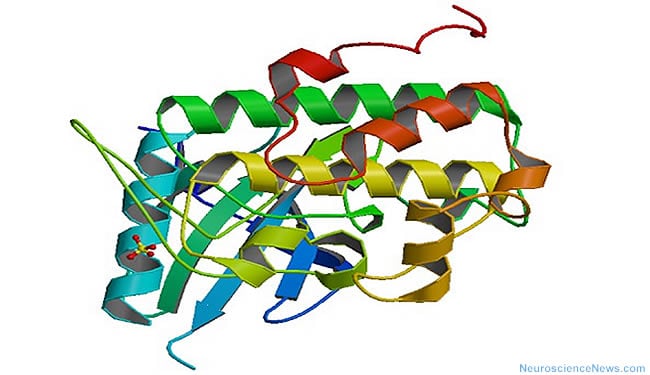Researchers at Case Western Reserve University School of Medicine have discovered a mutant form of the gene, Chk1, that when expressed in cancer cells, permanently stopped their proliferation and caused cell death without the addition of any chemotherapeutic drugs. This study illustrates an unprecedented finding, that artificially activating Chk1 alone is sufficient to kill cancer cells.
“We have identified a new direction for cancer therapy and the new direction is leading us to a reduction in toxicity in cancer therapy, compared with chemotherapy or radiation therapy,” said Dr. Zhang, assistant professor, Department of Pharmacology at the School of Medicine, and member of the university’s Case Comprehensive Cancer Center. “With this discovery, scientists could stop the proliferation of cancer cells, allowing physicians time to fix cells and genetic errors.”
While studying the basic mechanisms for genome integrity, Dr. Zhang’s team unexpectedly discovered an active mutant form of human Chk1, which is also a non-natural form of this gene. This mutation changed the protein conformation of Chk1 from the inactive form into an active form. Remarkably, the research team discovered that when expressed in cancer cells, this active mutant form of Chk1 permanently stopped cancer cell proliferation and caused cell death in petri dishes even without the addition of any chemotherapeutic drugs.

The biggest advantage of this potential strategy is that no toxic chemotherapeutic drug is needed to achieve the same cancer killing effect used with a combination of Chk1 inhibitors and chemotherapeutic drugs.
Cells respond to DNA damage by activating networks of signaling pathways, termed cell cycle checkpoints. Central to these genome pathways is the protein kinase, called Chk1. Chk1 facilitates cell survival, including cancer cells, under stressful conditions, such as those induced by chemotherapeutic agents, by placing a temporary stop on the cell cycle progression and coordinating repair programs to fix the DNA errors.
It has long been suggested that combining Chk1 inhibition with chemotherapy or radiotherapy should significantly enhance the anticancer effect of these therapies. This idea has serves as the basis for multiple pharmaceutical companies searching for potential Chk1 inhibitors that can effectively combine with chemotherapy in cancer therapy. To date, no Chk1 inhibitor has passed the clinical trial stage III . This led Dr. Zhang’s team to look for alternative strategies for targeting Chk1 in cancer therapy.
Future research by Dr. Zhang and his team will consider two possible approaches to artificially activating Chk1 in cancer cells. One possibility is to use the gene therapy concept to deliver the active mutant form of Chk1 that the team discovered, into cancer cells. The other is to search for small molecules that can induce the same conformational change of Chk1, so that they can be delivered into cancer cells to activate Chk1 molecules. The consequence of either would be permanent cell proliferation inhibition and cancer.
Notes about this cancer research
All three authors of this study, Jingna Wang, Xiangzi Han and Youwei Zhang hold the title of Ph.D. and are members of the Department of Pharmacology, Case Western Reserve University School of Medicine, as well as members of the university’s Case Comprehensive Cancer Center. Dr. Wang and Dr. Han are postdoctoral fellows. Dr. Zhang is an assistant professor.
Support for the study comes from the National Cancer Institute at the National Institute of Health,
Grants that supported this study are NCI R00CA126173 and R01CA163214.
Contact: Christine A. Somosi – Case Western Reserve University
Source: Case Western Reserve University press release
Image Source: Chk1 image is adapted from an image obtained from the RCSB Protein Data Bank.
Original Research: Abstract for “Autoregulatory Mechanisms of Phosphorylation of Checkpoint Kinase 1” by Jingna Wang, Xiangzi Han, and Youwei Zhang in Cancer Research 1 August 2012 72:3786-3794; doi:10.1158/0008-5472.CAN-12-0523







